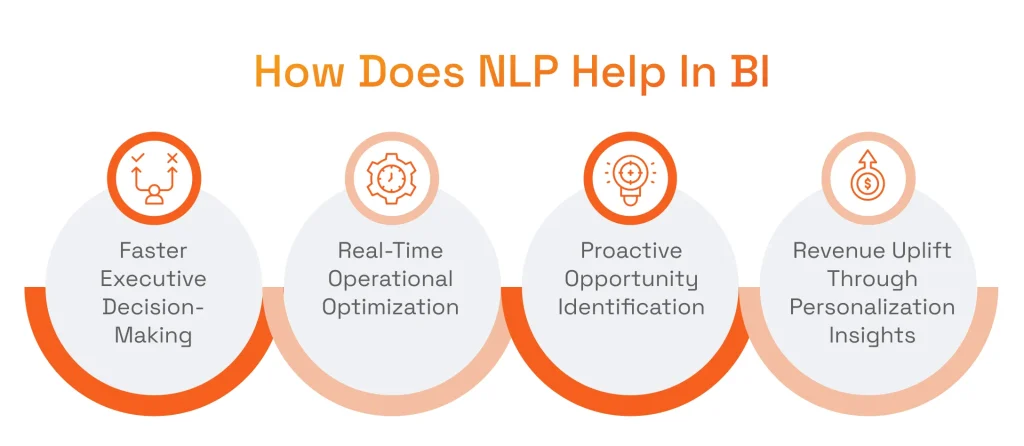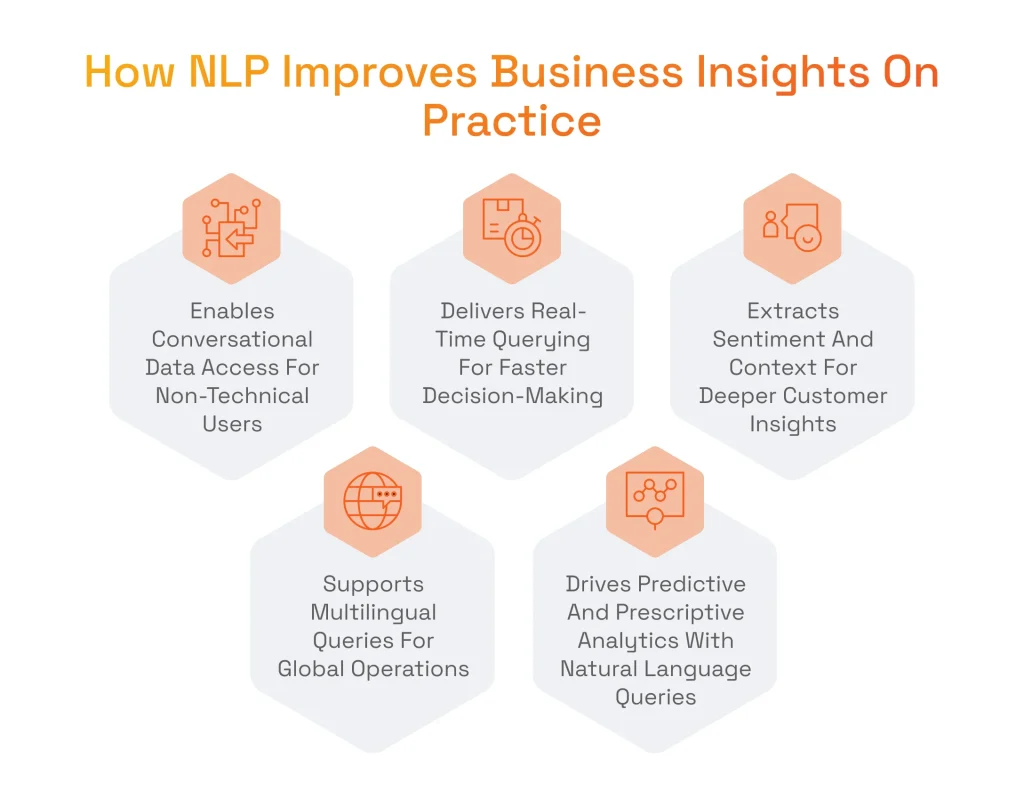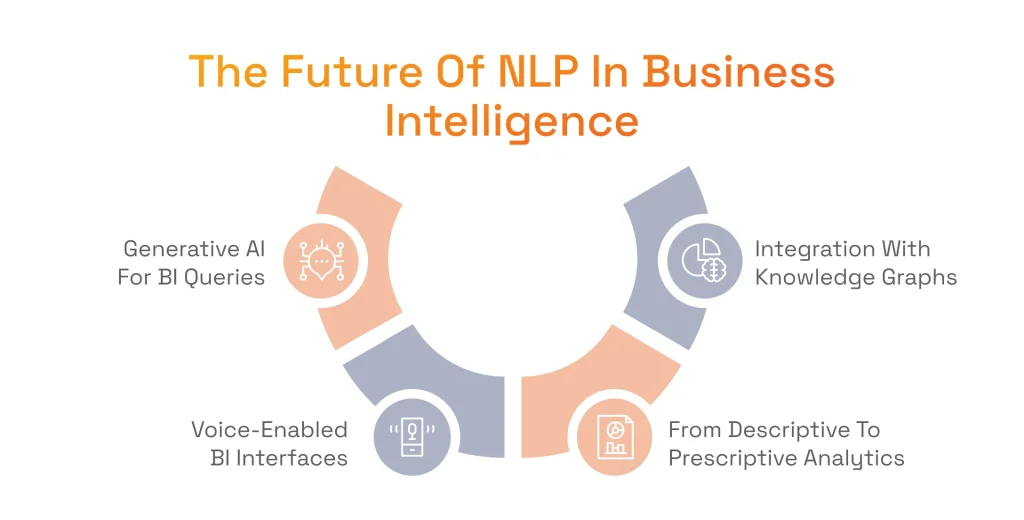Your business is producing more data than ever, but most of it is invisible to your traditional analytics tools. Industry reports consistently show that most enterprise data is unstructured: locked away in emails, customer reviews, support tickets, and social media posts.
Ignoring this information means missing the real story of your business. It’s a challenge leaders recognize, with nearly 88% of Fortune 1000 executives surveyed stating that investments in data and analytics are a top organizational priority. This executive focus is driving significant growth in the NLP market.
Traditional BI systems were not built to handle the modern complexity. They often provide a rear-view analysis rather than real-time insights, limiting quick decision-making. This delay creates a critical gap between data and action.
Closing that gap requires a new approach. A professional, strategic implementation of natural language processing in business intelligence is no longer an optional upgrade. It is a competitive necessity for any organization serious about growth. Let’s discuss natural language processing in BI and how NLP improves business insights.
How Does NLP Help in BI
Integrating natural language processing in BI is about fundamentally changing how your company uses all of its data, unifying the structured information in your databases with the vast amounts of unstructured text in emails, reports, and customer feedback. The goal is to make all information serve your business needs, shifting your BI framework from a tool that only understands rows and columns into a responsive asset that can interpret human language. NLP helps BI by bridging the gap between human language and machine-readable data.

This unified approach translates raw information into tangible business advantages. By allowing for a more direct and intuitive way to query both structured and unstructured data simultaneously, it creates significant gains in operational speed, helps uncover opportunities hidden within customer comments and operational reports, and provides a sharper competitive edge for your entire organization.
Faster Executive Decision-Making
Gone are the days of executives waiting for data teams to decipher complex queries. With NLP in business intelligence, leaders can simply ask questions in plain English. “What were our top-selling products in the EU last quarter?”. They get immediate and straightforward answers.
This direct line to data removes bottlenecks and empowers faster and more confident data-driven decisions from the top down. It’s a massive shift from the rigid structure of traditional BI querying.
Real-Time Operational Optimization
Your business generates a constant stream of unstructured data through support tickets, social media mentions, and live chat. NLP tech in business intelligence acts as a digital nervous system, monitoring these channels in real time.
Sentiment analysis business intelligence can instantly detect a sudden surge in negative customer sentiment or identify a recurring bug mentioned in support conversations, allowing your teams to address operational fires before they spread. This ability to monitor and react in real time is a clear example of the Big Data impact on business when the right tools are in place to interpret it.
Proactive Opportunity Identification
What do your customers want next? The answers are often buried in thousands of product reviews, feedback forms, and survey responses. NLP sifts through this goldmine of unstructured text to spot emerging trends, popular feature requests, and gaps in the market.
NLP technologies in business intelligence help you find the next big opportunity by understanding what your customers are asking for, often before they say it directly.
Revenue Uplift Through Personalization
Effective personalization is built on genuine understanding of your customer behavior. Custom AI solutions move beyond basic customer segments to analyze the intent and nuance in their language. By discerning what customers truly mean, you can deliver hyper-personalized marketing and product recommendations that connect on a deeper level.
How NLP Improves Business Insights in Practice
Theory is one thing. Practical application is another. So, how does NLP help in BI? When natural language processing is correctly applied to enterprise business intelligence, it fundamentally changes how your organization interacts with its own data. It moves information out of siloed dashboards and into the daily workflow of your entire team. You turn data from a historical record into a tool for immediate action and future strategy. The transition from reactive to proactive analysis is a key benefit of NLP for business operations.
Instead of waiting on a data analyst, a sales manager can ask Power BI, “Show me the top-performing regions for our new product line,” and get an instant visual report. This capability puts powerful analytics directly into the hands of the people who need it, creating a more agile, data-literate organization.

It’s a world away from the rigid structure of traditional BI data querying. This is where your teams can start winning back time and making sharper decisions. NLP enables conversational data access, letting staff query databases just by asking questions.
The speed of modern business requires immediate answers. With NLP, your teams get real-time querying capabilities that match this pace. A marketing leader can ask about a campaign’s performance over the last 24 hours and receive a synthesized report on the spot. The availability of real-time data strengthens the relationship between NLP and decision-making. This immediacy allows for quick pivots and adjustments, ensuring you’re always acting on the most current information.
Serhii Leleko
ML & AI Engineer at SPD Technology
“In today’s market, the speed of insight is a direct competitive advantage. NLP closes the gap between an event happening and the business understanding why it happened.”
The system also extracts deeper customer insights by going beyond simple keywords. Context-aware NLP algorithms can differentiate between sarcasm and authentic feedback, giving you a far more accurate read on customer satisfaction.
For global companies, scattered data is a constant challenge. NLP supports multilingual global operations, analyzing customer feedback and operational data from different languages to create a single, unified view. Suddenly, you have a clear picture of customer sentiment and performance across all markets. This analytical depth also drives predictive and prescriptive analytics.
Asking “What are the key drivers of customer churn?” can trigger models to not only identify at-risk customers but also suggest the most effective retention strategies. Your BI system stops just reporting the past and starts actively guiding your future. This entire process underscores the value of modern data analytics services.
NLP for Business Across Industries: Use Cases and Successful Projects
The true value of natural language processing in business intelligence becomes clear when you see it applied to specific real-world challenges. It’s a versatile tool that adapts to solve unique problems across different sectors.
From retail to legaltech, NLP adapts to diverse business problems. Our natural language processing services accelerate results across sectors with industry-specific models. We help our clients find efficiencies and uncover opportunities hidden within their text data.
Serhii Leleko
ML & AI Engineer at SPD Technology
“A model trained on legal contracts learns a different ‘language’ than one trained on social media sentiment. This domain-specific tuning is what transforms a general tool into a precision instrument for any industry.”
The following examples show how these principles work in practice.
eCommerce
In eCommerce business intelligence, success depends on understanding customers at a massive scale. NLP analyzes thousands of product reviews to get an accurate measure of customer sentiment, far beyond simple star ratings. It also powers the AI chatbots that provide instant, 24/7 customer support. As for the example, we developed an AI chatbot for the online fashion store, designed to handle huge traffic volumes, ensuring a smooth customer experience even during peak shopping seasons and freeing up human agents to focus on more complex issues. The application of NLP for business in customer-facing roles is critical for scaling support.
Manufacturing
Downtime on the factory floor can cripple productivity. The warning signs of equipment failure are often buried in unstructured maintenance logs and operator notes. NLP reads and understands this text, identifying recurring patterns that precede a breakdown. Maintenance shifts from a reactive fix to a predictive strategy, saving significant time and money.
Predictive maintenance powered by NLP is one of the most impactful business intelligence success stories in the industrial sector. Our portfolio also includes an ML solution for a packaging manufacturer that analyzed operational data to find these kinds of efficiencies, directly improving their bottom line.
Fintech
The financial industry runs on information. NLP automates the process of extracting critical data from news articles, financial reports, and market filings to assess risk and spot investment opportunities. It allows analysts to make faster and better-informed decisions based on financial business intelligence.
Automating complex data processing shows how NLP enhances business intelligence, especially in highly regulated industries. We helped a B2B intelligence firm by optimizing their data collection and processing with ML and OpenAI. The automated data collection and processing solution delivered more accurate insights to their clients in a fraction of the time it took manually.
Legaltech
Legal work is incredibly text-intensive. NLP is a perfect fit for automating the review of contracts, speeding up e-discovery, and assisting with legal research. These tools can analyze thousands of documents to find relevant information or flag unusual clauses in a contract, reducing hours of manual work. We have direct experience in this area, having developed a custom B2B Legaltech solution that increased the accuracy of document processing for our client, successfully streamlining complex legal workflows and boosting the client’s customer base by 40%.
The Future of NLP in Business Intelligence: What to Expect
The integration of natural language processing in BI is an accelerating field and not a static endpoint. The capabilities available today are just the beginning. As the underlying AI models become more sophisticated, the way businesses interact with their data will continue to shift in fundamental ways, moving from simple queries to genuine strategic partnerships with their BI systems. Such a forward-looking perspective is central to the growing field of AI for business intelligence, where the goal is to create a more symbiotic relationship between humans and data. The natural language processing future is tied to this deeper level of integration.

The rise of generative AI for BI queries is a clear next step. Soon, your tools will move beyond just answering questions. Instead, a single prompt will trigger the creation of a complete analytical report, complete with written narratives and key takeaways. This evolution will be complemented by voice-based BI tools, offering proper hands-free decision support. An executive will be able to get critical sales forecasts or supply chain updates simply by asking a smart device during their morning commute.
This progress also marks an expansion to fully prescriptive analytics. Many industry voices agree that the next significant milestone in BI is prescriptive analytics. Your BI system will evolve from telling you what happened and what might happen to actively recommending what you should do. It will suggest optimal business strategies based on its analysis.
It’s all made possible through integration with enterprise knowledge graphs, where NLP will connect disparate data sources across your organization. You get a more context-aware analytical fabric, which allows your BI tools to understand the complex relationships within your business and deliver far more intelligent insights.
Unlock NLP for Business Growth with SPD Technology
Putting natural language processing in business intelligence to work effectively is about more than just having the right technology. The real difference comes from a strategic partnership that connects the power of AI to your specific business goals. It’s how an NLP project becomes a true competitive asset.
Our data strategy consulting is designed to build this bridge between technology and tangible results. We specialize in delivering advanced business analytics with NLP, ensuring that every solution is designed to integrate perfectly with your operations and drive growth.
- Business-First Integration. We start with your business challenges, ensuring the solution aligns with your broader enterprise data strategy to improve data-driven decision-making where it counts.
- End-to-End Data Readiness. Effective insights rely on strong data quality management. We handle the entire pipeline, from preparation to governance, creating a reliable foundation for analysis.
- Domain-Tailored NLP Models. We don’t believe in one-size-fits-all AI. Our models are customized to understand the specific language and context of your industry, ensuring much higher accuracy and relevance. Our ML development services focus on creating these bespoke models to ensure much higher accuracy and relevance.
- Embedding into Existing BI Ecosystems. Our goal is to enhance the BI tools you already use, transforming them into powerful natural language BI platforms without causing unnecessary disruption.
- Multilingual and Multimodal Capabilities. We build systems that can analyze unstructured data from multiple sources and in various languages, giving you a clear, consolidated view of your global operations.
- MLOps-Driven Lifecycle Management. Our solutions are built for the long term. We implement MLOps practices to ensure your AI models are monitored, maintained, and continuously improved over time.
- Compliance and Responsible AI Built-In. We design every solution with security, privacy, and ethical AI principles from the ground up, so you can trust the results.
- Proven Track Record. Our experience in data-intensive industries means we understand the challenges and know how to deliver solutions that work in the real world.
Conclusion
The ability of NLP in business intelligence to turn unstructured data — customer feedback, support tickets, market chatter — into a strategic asset is evident. It breaks down the barriers between your teams and your data, making faster, smarter decisions and setting the new data usage standard across your organization. This is how you find the real answers hidden in your data.
If you’re ready to move beyond the limitations of traditional BI, let’s talk. Contact us to see how our NLP in BI services can directly impact your business growth.
FAQs
How can we use NLP for analyzing customer support conversations to improve our service?
NLP models analyze support transcripts for sentiment, recurring issues, and agent performance. Natural language processing helps you pinpoint product flaws, identify team training needs, and improve customer satisfaction by addressing problems proactively.
What are the first steps our company should take for an enterprise NLP BI platform implementation?
It starts with a strategic assessment. We can help you identify a high-impact business problem, evaluate your current data analytics infrastructure and data quality, and define clear success metrics. In such a way, we ensure the project begins with a clear path to value.
What factors influence the cost of NLP integration in business analytics, and how do you ensure ROI?
Cost depends on data complexity, model customization, and integration scale. We ensure ROI by focusing on a specific business case, like reducing customer churn or automating a manual process, to deliver measurable financial improvements.

